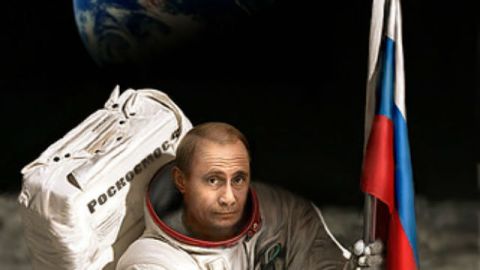Putin in Space

“The law is still the law, and we must follow it whether we like it or not.”
– Vladimir Putin, September 11, 2013, The New York Times
President Putin should have listened to himself and not invaded Ukraine. After repeated pressure from the rest of the world, except for Syria’s Assad and North Korea’s Kim Jong-on, Putin annexed Crimea and may keep going. In a bizarre chest-thumping speech on Tuesday, he touted Russian might. In addition to essentially outlawing homosexuality and journalism, censoring the Internet, Putin’s Russia put up statues of Stalin. As Angela Merkel told President Obama, Putin seems to be “in another world.” What does that mean for Western astronauts who are currently high above our world, and depend on Russia to come home?
As humans on Earth try to resolve human rights crises, scientific research in Space must be, forgive the pun, above being used as a bargaining chip. As Kremlin observers like to point out, Putin’s behavior is consistent. And that behavior is consistently crazy. Russia provides the West’s only means of transportation to and from the International Space Station, “a $100-billion orbiting science laboratory.” Can we trust Putin to continue to honor his agreement with NASA?
Matt Gurney atThe National Post is optimistic:
The Russians have reasons to not rock this boat either, of course. Money being a big one: NASA signed a contract worth three-quarters of a billion dollars with Russia to handle all the transportation to and from the station, as well as provide rescue capabilities should they ever be needed, through to 2016. This represents a sizable chunk of Russia’s space exploration budget, which, at US$5.6-billion a year, is far from what it was during the heyday of the Soviet space program. And the Russians would think twice before doing anything that would make anyone wary of partnering with them on future space ventures. Trust, once lost, is hard to replace.
So our already dwindling space program may be safe. After Putin bit off Crimea, which has a diverse population that’s less than 60% Russian, the West must enact harsher sanctions than the “warning shot” fired earlier this week. It’s not the potential threat to our scientific research that’s preventing them. “Money talks, value walks,” one EU insider told BuzzFeed, citing fear of losing Russian business for why Europe offered sanctions that were little more than a slap on the wrist.
In our increasingly interdependent global economy, sanctions may indeed be a complicated issue, but when holding a brazen despot accountable they shouldn’t be. What should absolutely be off-the-table is a country’s space program, and luckily Putin is too vain to deny his country the glory and the resources Russia needs (from us) to remain in Space.
Image credit: AZRainman



